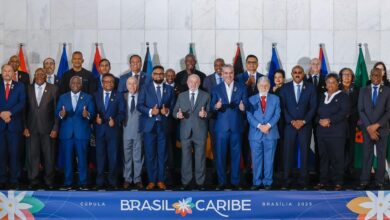CARICOM Ministers with responsibility for Environment and Sustainable Development met for the 112th Special Meeting of the Council for Trade and Economic Development on the Environment and Sustainable Development which took place on 15 May 2024.
Ministers considered the compounding impacts of the planetary crises of climate change, biodiversity loss, and pollution, as well as the economic uncertainty due to external shocks, and limited institutional and financial capacity. They noted that the Region’s survival continues to be severely challenged, and time for securing a sustainable future is fast running out.
Ministers remained concerned that as the years progress, the Region’s vulnerability is increasing while its access to climate finance on concessional terms is increasingly limited, resulting in the smallest allocations amongst all groupings. Concern was also expressed about the insufficient funding for adaptation and resilience building, against the background of increasing loss and damage resulting from the growing frequency and intensity of climate-linked disasters.
In this regard, Ministers viewed the Fourth International SIDS Conference as historic, presenting an opportunity to chart a new course to resilient prosperity of Small Island Developing States, building on the outcomes of the previous three conferences. Ministers were unified in the call that the special case for SIDS must be reaffirmed. They pledged their full support to the Government of Antigua and Barbuda, host of the Fourth SIDS conference and indicated that there is a special onus on CARICOM SIDS to lead the charge. Ministers committed to the implementation of the new Antigua and Barbuda Agenda for SIDS (ABAS) as a platform for concrete actions to address the unique vulnerabilities of SIDS.
Considering that COP29 will be a “finance COP,” Ministers emphasized that the special circumstances of Small Island Developing States, which have been affirmed in the United Nations Framework on Climate Change and the Paris Agreement, are a main priority for the Region and must be operationalized throughout the climate change policy agenda and appropriately reflected in the decision establishing the new collective quantified goal on climate finance.
In this regard, Ministers called for 1.5 degrees Celsius limit above preindustrial levels to remain the north star for mitigation ambition; that the best available science be the technical basis for defining the ambition of updated Nationally Determined Contributions and provision of adaptation finance; and that finance, capacity-building and technology transfer be adequately provided to maintain global warming limit below 1.5 to meet the objectives of Paris Agreement. Ministers called for developed countries to take the lead in delivering mitigation plans and financial commitments commensurate with an ambitious 1.5 aligned agenda. Finally, Ministers affirmed that the new finance goal must also assure protection for the most vulnerable having regard for their needs and priorities for adaptation and for responding to increasing loss and damage now.
As we head to COP 29, Ministers stated that SIDS issues on access, quality, and transparency of climate finance must be reflected in the draft substantive framework to be prepared for the negotiations of the New Collective Quantifiable Goal. In addition, the Ministers emphasized that the new climate finance goal can support the roles of regional and national direct access entities in facilitating and mobilizing access to finance.
The Ministers also considered the Region’s progress in ratification of the New Biodiversity Beyond National Jurisdiction (BBNJ) Treaty. They congratulated the Government of Belize as the first Caribbean country to ratify the treaty and noted the progress made by other CARICOM Member States in preparing to sign or ratify. The Ministers noted the strong linkages between the BBNJ Treaty with the Convention on Biological Diversity and the international dialogues on Intellectual Property, Genetic Resources and Traditional Knowledge Associated with Genetic Resources and called on the CARICOM Multistakeholder Advisory Group on BBNJ to pay close attention to these linkages.
The Ministers of Environment remained deeply concerned about the unsustainable linear plastic production models that have impacts on human health and resulting in untenable amounts of plastic pollution leakage into every ecosystem on earth. Ministers committed to continue strong engagement, in partnership with AOSIS, in the final stages of the global plastic pollution treaty negotiations to secure an ambitious treaty that substantially reduces harmful chemical compounds in plastic products, provides a framework of support for remediation of legacy plastics pollution, reduces single-use plastics and micro plastics, and promotes circular approaches.
Ministers underscored that technology transfer and innovation in key sectors are critical to SIDS, engagement of civil society and in particular, youth and community groups and robust data systems to monitor and evaluate impacts of interventions, regional collaboration and knowledge sharing among SIDS, must drive implementation.
Ministers called for a unified and collaborative approach as the Region participates in the high-level engagements scheduled for 2024. Recognising that the Fourth SIDS Conference presents an opportunity for recalibration to place SIDS on the path to resilient prosperity, they urged the active engagement of Member States, partners and stakeholders.
MAY 2024






